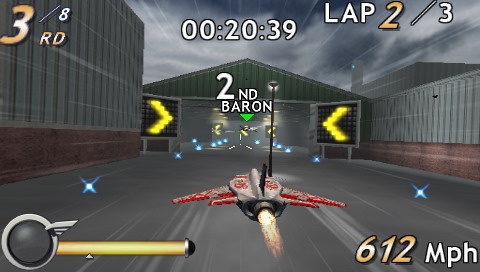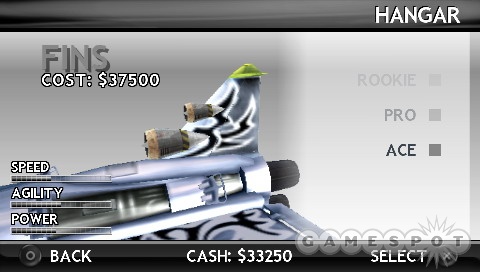M.A.C.H. Q&A
We pay a visit to Kuju's studios to find out how its PSP flying-fighting-racing game turned out.
Anybody who watched the film Top Gun couldn't help but admit to harbouring a fantasy to fly cool planes, shoot down enemies, and generally defy the laws of gravity. The team at Kuju, based in Godalming, UK, clearly all have that dream, and that's why they've been working on M.A.C.H., a flight-racing game for the PlayStation Portable, complete with plane customisation and multiplayer dogfighting.
The game is already out in the US and is due out shortly in Europe, so we took some time with Kuju lead coder Sean Murray and programmer Dave Ream to find out what it has been like working on the project and what we can expect from it.
GameSpot UK: How long has the game been in development?
Sean Murray: Over a year, although it depends where you measure it from. It's actually been completed for a while, but there's submission and so on. It's already out in Japan.
GSUK: What has it been like to work on?
SM: It's been really good fun. I know everybody says this, but it's the kind of game the team likes to play. A lot of us have DS or PSP handhelds, and a lot of us use them on the way to work, so we understand the genre.

GSUK: The emphasis in the game is arcade fun and accessibility. Were those the core objectives to begin with?
SM: Yeah, absolutely. It's a PSP exclusive, so it's been built from the ground up for the PSP. It's got a more casual or mainstream audience, and the way that you use it--you don't want to sit for 10 hours playing it, so it always had to be pick-up-and-play. That's also important for racing games, and in flying-racing games, a lot in the past have been hard to control. Since we have combat in it as well, you had to want to go faster, so it had to be easy to get into--and that was one of the biggest challenges.
GSUK: There are going to be a few flying games out for the PSP in quick succession. Why do you think that is?
SM: It's coincidental. Afterburner's coming out presumably because the next-gen arcade game was talked about; Heatseeker's coming out, which wasn't originally envisioned I don't think for the PSP; and M.A.C.H. was developed completely in isolation. We liked the original Afterburner, but when our game was conceived we hadn't heard anything about the next-gen remake. So it is coincidental, but it suits the PSP. They're three very different games. With ours you've got flying and racing, but also, the combat is like deathmatch.
GSUK: If you could pinpoint one aspect of the game that you'd like to define M.A.C.H., what would it be?
Dave Ream: I think it would be that we've really focused on the gameplay. We've got what we wanted from it.
SM: It's slick, it's arcade--it's the controls, the frame rate, the handling. It's not a game that took itself too seriously I think. We're not going to claim it's a lot of different things, but we'd hope it's the kind of game that people will get on the PSP and play for a bit, dip in and out, more than they would other games. We're finding that a lot of the games out there are really suited to that really quick hit.
GSUK: You say the game doesn't take itself too seriously--that would explain the possibility of flying a big pink cargo ship. Tell us a bit about the customisations available in the game.
DR: Basically it gives you the freedom to select lots of stuff and put it on a whole load of different planes, from chunky cargo planes to sleek fighters. It enables you to have your own style.

GSUK: How much impact do these customisations have on the plane's performance?
SM: There are two things that are unique about that. One would be the range of speeds--starting at 500 and going to 1,500, and not many games do that tripling of speeds, usually only raising it by about 10 to 15 percent. Sometimes you can't believe that somebody's controlling it at those speeds, and it's the mods that bring that out. There's also the dogfighting, and what you might find is that somebody prefers one plane for racing and another for fighting.
GSUK: You're clearly keen that there's always something for people to do in the game?
SM: Arcade games are great like that. Space Invaders--you can play that forever, just keep on trying to get better, and that's what we want. Pick up and play, where you can always just dip in, complete a level, beat your high score. It's not necessarily really shallow, not necessarily really deep, but that's an arcade game for you. There is a lot to do, lots of different challenge modes, and dogfighting is just as big a component as the racing.
GSUK: If there were one thing you could change about the game, what would it be?
SM: I think its strengths are its weaknesses. Where it's really arcadey, some people will come to it and find it shallow, and where we've made it easy to get into, they'll play the first few levels and think the whole game's too easy. There are things I'd do to mix up the structure, but I think we'd love to have it faster, just have more of everything really. What we did, we think we did well.
DR: I think we got to where we are now, we've managed to get this awesome game done, and now we'd love to run further with that.
GSUK: Thanks for your time, guys.
Got a news tip or want to contact us directly? Email news@gamespot.com
Join the conversation